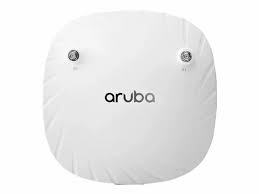R2H28A Specification |
Series | Aruba AP-505 |
AP type | Indoor, dual radio, 5GHz and 2.4GHz 802.11ax 2x2 MIMO |
5GHz radio | Two spatial stream Single User (SU) MIMO for up to 1.2Gbps wireless data rate with 2SS HE80 802.11ax client devices |
2.4GHz radio | Two spatial stream Single User (SU) MIMO for up to 574Mbps (287 Mbps) wireless data rate with 2SS HE40 (HE20) 802.11ax client devices |
Maximum number of BSSIDs | 16 BSSIDs per radio |
Supported frequency bands (country-specific restrictions apply) | • 2.400 to 2.4835GHz • 5.150 to 5.250GHz • 5.250 to 5.350GHz • 5.470 to 5.725GHz • 5.725 to 5.850GHz |
Available channels | Dependent on configured regulatory domain |
Supported radio technologies | • 802.11b: Direct-sequence spread-spectrum (DSSS) • 802.11a/g/n/ac: Orthogonal frequency-division multiplexing (OFDM) • 802.11ax: Orthogonal frequency-division multiple access (OFDMA) with up to 8 resource units |
Supported modulation types | • 802.11b: BPSK, QPSK, CCK • 802.11a/g/n: BPSK, QPSK, 16-QAM, 64-QAM, 256-QAM (proprietary extension) • 802.11ac: BPSK, QPSK, 16-QAM, 64-QAM, 256-QAM, 1024-QAM (proprietary extension) • 802.11ax: BPSK, QPSK, 16-QAM, 64-QAM, 256-QAM, 1024-QAM |
Antenna | 2 Internal Omni-directional 5.7 DBi Antenna |
Maximum number of associated client devices | Up to 256 associated client devices per radio |
Supported data rates (Mbps) | • 802.11b: 1, 2, 5.5, 11 • 802.11a/g: 6, 9, 12, 18, 24, 36, 48, 54 • 802.11n: 6.5 to 300 (MCS0 to MCS15, HT20 to HT40), 400 with 256-QAM • 802.11ac: 6.5 to 867 (MCS0 to MCS9, NSS = 1 to 2, VHT20 to VHT80), 1,083 with 1024-QAM • 802.11ax (2.4GHz): 3.6 to 574 (MCS0 to MCS11, NSS = 1 to 2, HE20 to HE40) • 802.11ax (5GHz): 3.6 to 1,201 (MCS0 to MCS11, NSS = 1 to 2, HE20 to HE80) |
802.11n high-throughput (HT) support | HT20/40 |
802.11ac very high throughput (VHT) support | VHT20/40/80 |
802.11ax high efficiency (HE) support | HE20/40/80 |
802.11n/ac/ax packet aggregation | A-MPDU, A-MSDU |
Transmit power | Configurable in increments of 0.5 dBm |
Maximum (aggregate, conducted total) transmit power (limited by local regulatory requirements) | 2.4 GHz band: +21 dBm (18dBm per chain) 5 GHz band: +21 dBm (18 dBm per chain) Note: conducted transmit power levels exclude antenna gain. For total (EIRP) transmit power, add antenna gain. |




